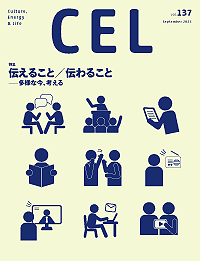
山下 満智子
作成年月日 |
執筆者名 |
研究領域 |
カテゴリー |
媒体(Vol.) |
備考 |
|---|---|---|---|---|---|
|
2014年03月31日 |
山下 満智子
|
住まい・生活 |
食生活 |
研究報告 |
ページ内にあります文章は抜粋版です。
全文をご覧いただくにはPDFをダウンロードしてください。
CHAPTER 5: CONCLUDING REMARKS
Chapter 1
Measurements of human brain activity when cooking using a near-infrared measurement device
The objective of this study is to measure brain activities. Measurements were obtained using a near-infrared measurement device (NIRS).
We performed the measurements of brain activity on 15 female adult subjects (mean age 45.3) while they conducted cooking activities, using a near-infrared measurement device (optical topography system). While the measurements were being taken, the subjects performed the following tasks; “planning a menu for dinner,” “cutting ingredients,” “frying the cut ingredients with gas,” and “serving the dishes.” In the optical topography system, a near-infrared light is directed at the head. This light passes through the skull and continues until it reaches the cerebral cortex. The information contained in this lights is related to the activities of the cerebral cortex. The cerebral cortex controls communication, self-care, creativity, thinking, memorizing, learning, self-control, emotional-control, vitality etc.
The results showed that the cerebral cortex of both hemispheres of the brain was activated during all cooking tasks. Thus, it can be concluded that cooking activities stimulate the cerebral cortex.
Chapter 2
Cooking improves the prefrontal functions of elderly males with an intervention method
The objective of this study is to prove that daily acts of cooking improve human brain functions.
We performed the daily intervention program, which involved cooking on 21 healthy male subjects aged 59 - 81 (mean age 68.5), during a three-month period. We conducted brain activity tests to measure the subjects' brain functions prior to and after the three-month intervention program. The results of the pre-test and the post-test were compared and analyzed. The brain tests conducted in the interview method were FAB (Frontal assessment battery at bed side), Stroop, Topology Test, Digit-symbol test and MMSE (Mini mental state examination).
In the intervention program, the subjects attended a cooking course once a week in order to learn daily basic cooking techniques and cooked at home 15 - 30 minutes per day at least five times a week.
The results of the brain tests showed a statistically significant improvement in the scores after the three-month intervention program compared to before the intervention program.
From these results, we can come to the conclusion that daily acts of cooking can improve the abilities which are controlled by the prefrontal cortex of the brain and are associated with communication, self-care, self-control and emotional-control etc.
Chapter 3
Effect of parent-and-child cooking on cognitive functions of children:
daily intervention program and measurement with near-infrared spectroscopy
The objective of this study is to demonstrate that a child’s daily participation in parent-and-child cooking improves a child’s brain functions.
We performed a daily intervention program of parent-and-child cooking, and measured brain activity using NIRS.
In the daily intervention program, 29 child subjects and their parents were randomly divided into two groups. The intervention group consisted of 16 children (mean age 8.9) and their parents. The control group consisted of 13 children (mean age 8.8) and their parents. The children and parents of the intervention group attended a cooking course once a week and performed daily cooking activities together during a three-month interval. Before and after this interval, 8 tests were conducted to measure the children's brain functions. The variations between the pre-test and the post-test measurements were statistically examined through a paired t-test. The results were analyzed to determine whether the variations were statistically significant or not.
In the measurement study, a probe set was placed on the head of 8 children (mean age 10.3), covering the dorsolateral prefrontal cortex. The subjects' brain activities were measured while subjects performed two cooking tasks; “making pancakes with gas stove” and “serving pancakes.”
The results of the daily intervention program showed a significant improvement in subjects’ score on the conception test for the intervention group. In addition, we found a statistically significant difference of the variation between the intervention group and the control group for the conception test and the 2-D test.
The measurement study showed that the prefrontal cortex of both the right and left hemispheres of the brain was activated during both cooking tasks.
Together with previous studies, our study, involving the daily intervention program and the measurement study, suggests the possibility of the development of a child's brain functions through parent-and-child cooking.
Chapter 4
Effect of parent-and-child cooking on cognitive functions of parent:
daily intervention program and measurement with near-infrared spectroscopy
The objective of this study is to demonstrate the effects of parent-and-child cooking on the parent’s brain functions.
We performed a daily intervention program of parent-and-child cooking and, we measured the subjects’ brain activity while they conducted cooking activities using NIRS.
In the daily intervention program, 28 adult subjects and their children were randomly divided into two groups. The intervention group consisted of 16 parents (mean age 39.9) and their children. The control group consisted of 12 parents (mean age 38.8) and their children. The parents and children of the intervention group attended a cooking course once a week and performed daily cooking activities together during a three-month interval. Before and after this interval, 8 tests were conducted to measure the parents' brain functions. The variations between the pre-test and the post-test measurements were statistically examined through a paired t-test. The results were analyzed to determine whether the variations were statistically significant or not.
In the measurement study, a probe set was placed on the head of 9 parents (mean age 37.9), covering the dorsolateral prefrontal cortex. The subjects’ brain activities were measured while subjects prepared two dishes for lunch: ketchup-flavored rice with chicken and onion, and tomato salad. The parent-and-child cooking tasks included; ”searing a tomato,” “frying onions,” and “cooking rice with a gas stove.”
The results of the daily intervention program showed a significant improvement in the subjects’ scores on the 2-D test and the matching test for the intervention group. However, no statistically significant difference of variation was shown between the intervention group and the control group. This could be a result of the fact that the parents of both groups cook on a daily basis.
The measurement study proved that the prefrontal cortex of both hemispheres of the brain was activated while subjects performed all cooking tasks.
According to interviews conducted after the study, parents said after the parent-and-child cooking program that they not only could teach their children how to cook, but also could observe their child’s intellectual and emotional growth. This enabled the parent to gain confidence and feel a strong sense achievement and well as a higher sense of fulfillment with regards to raising their child. In addition, parents' brain functions were positively affected by these interactions.
This study, together with our previous studies, demonstrates the effectiveness of parent-and-child cooking on both the parent and child.
We studied on the effects of cooking. We performed a daily intervention program, and measured the brain activities using NIRS.
In the daily intervention program, statistically significant results were found particularly in elder males and children. In the measurement study, we found an improvement of the brain activities in all subjects (females and parent and child pairs) regarding all cooking tasks. The results suggest that cooking has positive effects on human brain functions.
Cooking is an act which only human beings can do. It has and always will be an important act for us. We firmly believe that our studies, based on brain science, proved the positive effects that cooking has on human brains and also reaffirm the importance of cooking.
情報誌CEL
